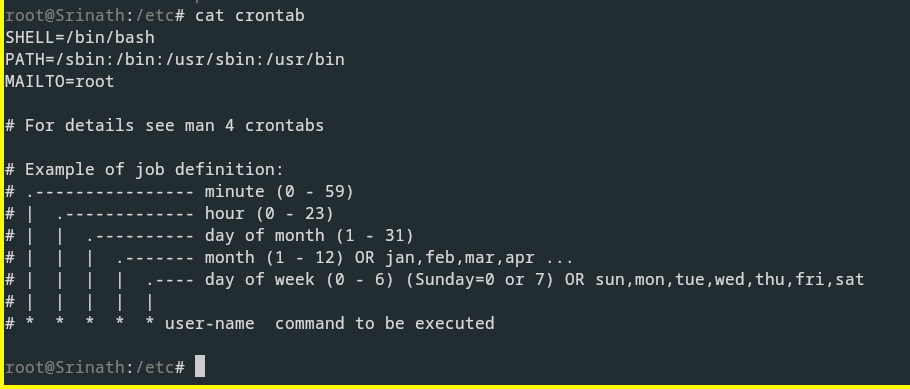
files


Cron jobs are stored in different locations based on whether they are for individual users or system-wide. Here are the main places where crontab entries are stored:
1. User-specific Cron Jobs:
- Location:
/var/spool/cron/crontabs/{user} - Each user has their own cron file stored in the directory
/var/spool/cron/crontabs/with the file named after their username (e.g., for the userjenny, it would be/var/spool/cron/crontabs/jenny). - Note: These files should not be edited directly; instead, use
crontab -eto edit the user’s cron jobs. Directly modifying these files could cause issues with the cron daemon.
2. System-wide Cron Jobs:
- Location:
/etc/crontab- This file contains system-wide cron jobs, which can be scheduled for any user. The syntax includes a user field to specify which user will run the cron job.
- Location:
/etc/cron.d/- This directory contains additional cron files where system-wide cron jobs can be stored. Each file here follows the same syntax as
/etc/crontaband can define cron jobs for different users.
- This directory contains additional cron files where system-wide cron jobs can be stored. Each file here follows the same syntax as
3. Hourly, Daily, Weekly, Monthly Jobs:
- Location:
/etc/cron.daily/,/etc/cron.weekly/,/etc/cron.monthly/,/etc/cron.hourly/- These directories contain scripts that are run at the specified intervals (hourly, daily, weekly, monthly). The scripts in these directories are executed automatically by cron at the designated times.
4. User-specific at Jobs:
- If you’re using the
atcommand to schedule a one-time task, those jobs are stored in/var/spool/at/.
Accessing and Editing:
- To edit a user’s cron jobs, you can use the
crontab -ecommand, which will open the user’s cron file in the default editor. - To list a user’s cron jobs, use
crontab -l. - To remove a user’s cron jobs, use
crontab -r.
Let me know if you need help with a specific cron-related task!